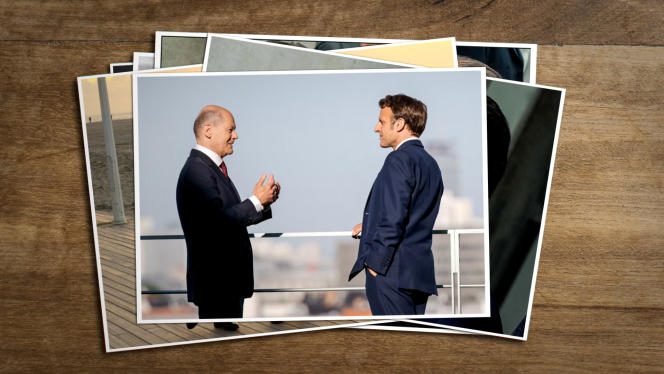ARTE – SATURDAY JANUARY 21 AT 5.15 P.M. – DOCUMENTARY
Evoking Franco-German relations is always delicate: a hackneyed subject, undermined by clichés and lending itself easily to caricatural speeches, either to deplore the failures of a team that we would like to be more harmonious than it is, or to welcome the close ties that unite two countries long considered two hereditary enemies.
Olivier Toscer’s excellent documentary avoids these pitfalls. Punctuated by fascinating interviews – including those of François Hollande; Bruno Le Maire; former German Minister Peter Altmaier; the current chair of the Bundestag’s Foreign Affairs Committee, Marie-Agnes Strack-Zimmermann; Paul Maurice, head of the Franco-German mission at the Quai d’Orsay… – he paints a precise and nuanced inventory of relations between the two countries, sixty years after the friendship treaty signed at the Elysée by Charles de Gaulle and Konrad Adenauer, January 22, 1963.
First quality of this documentary: the emphasis placed on the political, institutional or cultural differences that explain most of the misunderstandings that have arisen in recent years between Paris and Berlin. Rather than a classic story, a skilful montage of views on both sides of the border makes it possible, for example, to understand why Germany is so attached to the balance of public accounts and its government, sometimes so slow to make decisions, or, conversely, why France, by the role it intends to play as a military power or by the choice it has made in favor of nuclear power, sometimes finds itself at a profound distance from its great neighbor.
War in Ukraine
Second great quality of the film: its anchoring in the most recent news. If he looks back on some key moments of the past decade (from the 2015 refugee crisis, during which the reception policy unilaterally decided by ex-Chancellor Angela Merkel irritated Paris, to the Covid-19 pandemic , marked by the unprecedented conversion of Berlin to the idea long demanded by France of a common European debt), its red thread is indeed the year 2022, that of the war in Ukraine.
One of the consequences of the conflict will have been the weakening of Franco-German leadership in Europe
One of its consequences will have been the weakening of Franco-German leadership in Europe, particularly from the point of view of countries like Poland or the Baltic States. Criticized for having been too complacent vis-à-vis Vladimir Putin before February 24, 2022, and deemed too timorous, since then, in their military support for kyiv, Paris and Berlin have lost, in recent months, this credibility which has allowed them , in the past, to play a decisive role in the European adventure.
Rather than the image of the “couple”, used only in France, or that of the “engine”, which the Germans more readily use, it is a third image which is undoubtedly better suited to describe more accurately the singularity of this bilateral relationship: that of the “tandem”, as the German Liberal MP Michael Link explains in conclusion. This former Secretary of State for Foreign Affairs (2012-2013) talks about it in terms that can serve as a common roadmap: “By doing things correctly, in a synchronized way, then we are the strongest and we can serve as a model for others, but without giving lessons either, because we must not look down on anyone. »
France-Germany, a couple in therapy, documentary directed by Olivier Toscer (Fr.-Ger., 2022, 79 min). Available on Arte.tv until February 19.
